
VAT on Export Products in the UAE
VAT on export products in the UAE is generally zero-rated, but strict documentation is required. Learn how to stay compliant and avoid costly VAT issues.
Table of Contents
Related Articles


Sugar Tax Reform Will Crush Small UAE Drink Brands

The Impact of CARF on UAE Crypto Traders | Ready to Report FTA

Let's Talk
Sign Up For Free Consultation
VAT on Export Products
Value Added Tax (VAT) plays a pivotal role in the UAE’s taxation framework, introduced to ensure alignment with global financial practices and reduce the nation’s dependence on oil revenues. Implemented in 2018, VAT affects businesses across all sectors, with exporters benefiting significantly through the zero-rated VAT policy. This tax framework exempts exports from the standard 5% VAT, allowing businesses to reclaim input VAT on expenses while remaining competitive in international markets. However, compliance with VAT regulations is essential to avoid penalties and maintain operational efficiency.
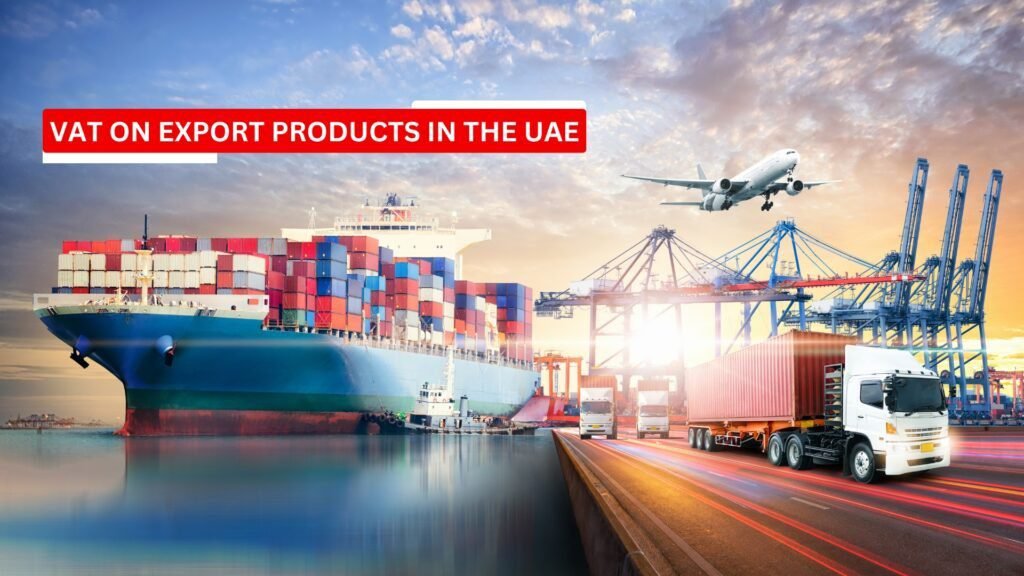
For exporters, zero-rating VAT means not charging VAT on international sales while retaining the right to recover VAT on associated input costs. This policy not only fosters cost efficiency but also supports the UAE’s goal of becoming a global trade hub. Businesses engaged in export activities must carefully adhere to documentation requirements, including maintaining customs declarations, invoices, and shipping proofs to substantiate zero-rated claims. Failure to comply with these standards can lead to complications, such as audits, penalties, or even denial of VAT recovery.
This article explores VAT’s application to export products in the UAE, detailing its zero-rating provisions, challenges, and compliance strategies. It also highlights the support offered by Tulpar Global Taxation, a leader in VAT advisory and compliance, helping businesses navigate the complex VAT landscape effectively and unlock financial advantages in the global market.
What is VAT and Why is it Important?
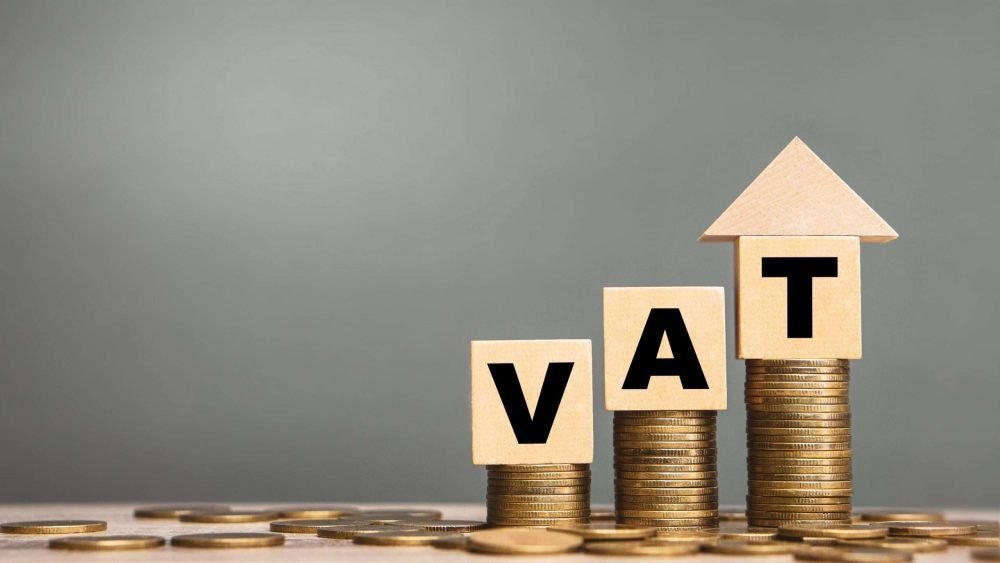
VAT, or Value Added Tax, is a consumption-based tax that applies incrementally at every stage of a product’s production and distribution cycle. It is charged on the value added at each step, making it a widely used tax mechanism globally. In the UAE, VAT was introduced in 2018 with a standard rate of 5%, applying to most goods and services within the domestic market. However, when it comes to exports, the UAE adopts a zero-rating policy. This approach ensures that businesses involved in international trade remain competitive by alleviating the tax burden on foreign buyers.
The zero-rating of VAT for exports means that businesses do not apply the 5% VAT on goods or services sold outside the UAE. At the same time, exporters can recover any VAT they paid on inputs such as raw materials, manufacturing costs, transportation, or logistics. For example, a company producing and exporting electronics might incur VAT on imported components, warehousing, or marketing. The zero-rating provision allows them to claim these amounts back, effectively reducing their operational costs and enhancing profitability in the global market.
This mechanism is particularly advantageous in bolstering the UAE’s standing as a global trade hub. By implementing this policy, the government incentivizes exports while ensuring businesses maintain a robust cash flow. Exporters must, however, adhere to stringent compliance requirements, such as maintaining proper documentation, including customs declarations and shipping invoices, to validate their zero-rated claims. This balanced approach aligns with the UAE’s economic vision, promoting trade while maintaining a transparent and efficient tax system.
Why VAT is Significant for Exporters
The introduction of VAT in the UAE has played a crucial role in boosting the country’s economic stability and facilitating its position in the global trade market. A key feature of the UAE’s VAT system is its zero-rated VAT policy on exports, which brings significant benefits to exporters.
First, the zero-rate VAT ensures that goods and services exported from the UAE are not subject to VAT, making them more affordable for foreign buyers. This helps UAE businesses remain competitive, as they can offer their products at more attractive prices compared to those in countries that impose higher VAT rates on exports. Second, the VAT system allows exporters to recover the VAT they pay on goods and services purchased locally. This recovery mechanism reduces the overall cost of production, further enhancing competitiveness while maintaining fair pricing in the international market.
In addition to the financial advantages, VAT compliance fosters a culture of transparency and accountability within businesses. It encourages proper record-keeping and reporting, which enhances the overall efficiency and professionalism of exporters. This is vital for strengthening the UAE’s reputation as a reliable, trustworthy, and efficient trading hub on the global stage. By aligning with international VAT standards, the UAE ensures that exporters not only benefit locally but also align with global best practices in trade.
VAT on Export Products: Zero-Rating Explained
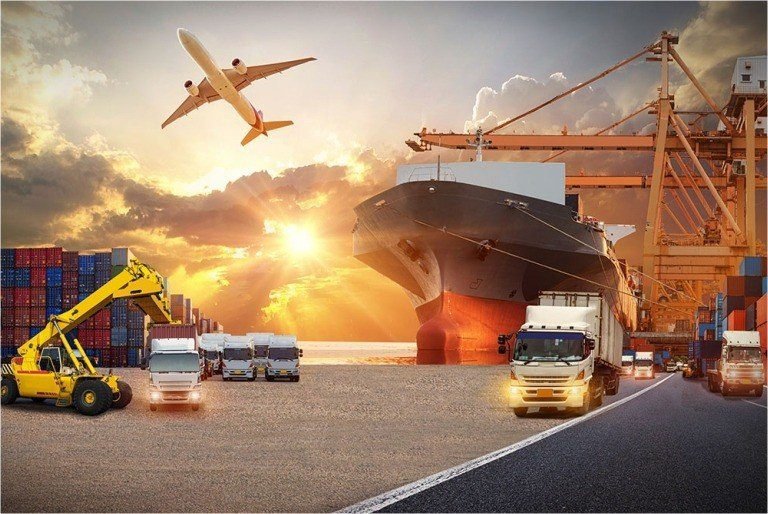
In the UAE, the value-added tax (VAT) on export products is set at a zero rate, meaning that goods and services exported outside the UAE are not subject to VAT. This zero-rating policy is designed to make UAE exports more competitive in international markets by reducing the cost burden on foreign buyers. When an exporter ships goods or services abroad, they do not charge VAT on the sale, ensuring that their prices remain attractive to international customers. This policy is crucial for keeping UAE products competitive globally, as it avoids the added expense of VAT that would typically raise prices in export transactions.
Furthermore, zero-rating allows businesses to recover the VAT they have paid on inputs used for producing export goods and services. This means that any VAT paid on local purchases such as raw materials, machinery, or services can be refunded, reducing overall operational costs for exporters. This recovery system is an essential aspect of the UAE’s VAT framework, ensuring that the tax burden remains neutral for businesses engaged in export activities. By implementing zero-rated VAT, the UAE fosters a more dynamic and competitive export sector, driving economic growth while supporting its position in the global trade arena.
What Does Zero-Rated VAT Mean?
Zero-rated VAT applies to supplies where the VAT rate is set at 0%. This means that businesses engaged in exporting goods or services from the UAE are not required to charge VAT on their invoices to international clients. By applying a zero percent VAT rate to exports, the UAE ensures that foreign buyers are not burdened with additional tax costs, making UAE-based products and services more competitive in global markets. This provision helps maintain the affordability and attractiveness of UAE exports, as businesses do not need to pass on any VAT charges to customers abroad.
In addition to this, businesses that export goods and services can still reclaim the VAT they have paid on their local business expenses. This is a critical feature of the VAT system in the UAE, as it allows exporters to recover the VAT on inputs such as raw materials, utilities, equipment, and other costs directly related to producing and delivering their goods. For instance, a furniture manufacturer in Dubai exporting products to Europe can zero-rate their sales invoices to European clients, but still claim back the VAT they paid on materials used to craft the furniture, electricity consumed in the manufacturing process, and even shipping costs associated with delivering the products abroad. This recovery mechanism ensures that VAT does not become a financial burden on exporters, helping them to maintain cost-efficiency and competitiveness while operating in international markets.
Types of Exports and Their VAT Treatment
Exports in the UAE can be categorized as follows:
- Direct Exports: Goods physically transported outside the UAE to a foreign buyer. These transactions qualify for zero-rating if sufficient proof of export is provided.
- Indirect Exports: Goods exported via an intermediary or through a third country. This category also qualifies for zero-rating if appropriate documentation is maintained.
- Exports to GCC Countries: VAT treatment varies depending on whether the recipient country has implemented VAT: 1) GCC Countries with VAT – The reverse charge mechanism applies, transferring VAT liability to the recipient. 2) Non-VAT Implementing GCC Countries – Treated as zero-rated exports, similar to transactions outside the GCC.
Each type of export requires strict adherence to documentation and compliance standards to benefit from zero-rating.
Benefits of Zero-Rating for Exporters
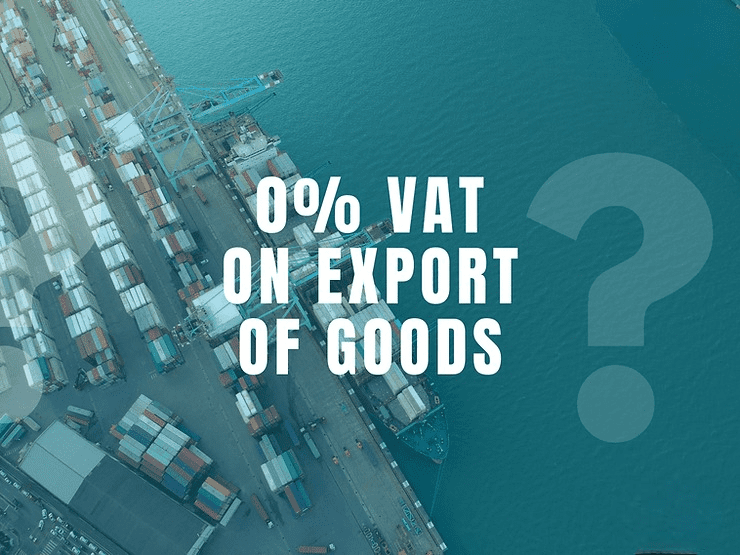
- Cost Efficiency:
By applying a 0% VAT rate on exports, businesses reduce the tax burden on foreign clients, making their products more attractive in international markets.
- Input Tax Recovery:
Businesses can claim back VAT paid on purchases and expenses directly linked to export activities. This ensures that operational costs remain manageable.
- Enhanced Competitiveness:
Zero-rating enables exporters to price their products competitively in global markets. Combined with the UAE’s strategic location and world-class infrastructure, this fosters international trade growth.
- Encouraging Global Trade:
The UAE’s VAT policy reflects its commitment to being a global trading hub. By reducing tax barriers for exporters, the country incentivizes foreign investment and strengthens trade relations.
Documentation and Compliance Requirements
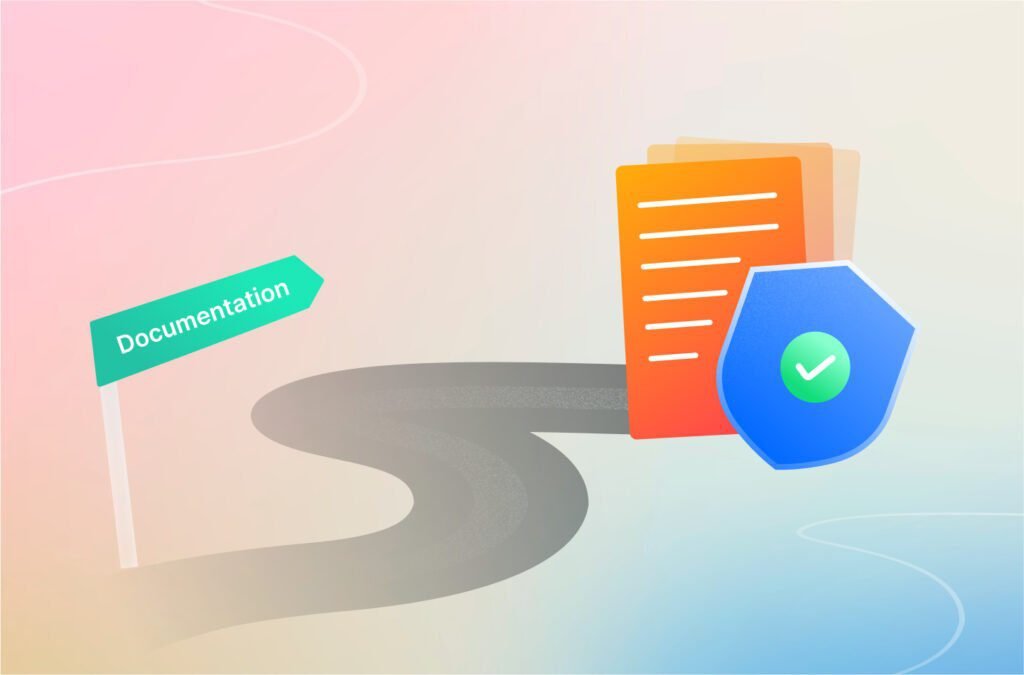
Essential Documentation for Zero-Rating
To qualify for the zero-rated VAT on exports, businesses are required to provide certain documentation that proves the goods have left the UAE and meet the criteria set by the VAT regulations. These requirements ensure that only legitimate export transactions benefit from the zero-rate VAT, promoting compliance and transparency.
- Customs Declarations
One of the essential documents businesses must provide is a customs declaration. This declaration serves as proof that the goods have physically exited the UAE. It must show the details of the exported goods, including their classification and destination. Customs declarations provide the necessary evidence that the products have been exported and are no longer part of the UAE’s domestic market. Without this documentation, businesses would not be able to qualify for the zero-rating on their exports.
- Shipping Evidence
Alongside customs declarations, exporters must also provide shipping evidence. This can include documents such as airway bills, bills of lading, or courier receipts, which track the movement of goods from the UAE to the foreign destination. These shipping documents validate that the goods were indeed shipped and delivered to an international location, supporting the claim for zero-rated VAT on the exported items. Proper shipping documentation is crucial to confirm the destination of the goods and to prove that the export transaction was completed as intended.
- Export Invoices
Another critical document is the export invoice, which must clearly identify the recipient and explicitly mention that the transaction is subject to the 0% VAT rate. The invoice should detail the nature of the goods, their value, and the terms of the sale. It’s important that the recipient’s details are provided accurately to ensure compliance with VAT laws. The invoice must also include a reference to the applicable zero-rate, ensuring that both the seller and the buyer are aware of the VAT treatment.
- Recipient Details
For the zero-rated VAT to apply, businesses must ensure that the recipient of the exported goods is located outside the Gulf Cooperation Council (GCC) VAT-implementing states. This means that the export must be to a country that is not part of the GCC VAT framework. The recipient’s details must be provided to confirm that the goods are being exported to an eligible destination. This is necessary to prevent fraud and ensure that VAT exemptions are applied correctly.
In addition to providing these documents, businesses must maintain accurate records of all export transactions. Retaining these records is critical for compliance with UAE VAT regulations, as businesses are required to keep such documents for at least five years. This retention period allows tax authorities to audit transactions and ensures that businesses can prove their eligibility for zero-rated VAT if required. By keeping detailed records, businesses safeguard themselves against potential compliance issues and ensure they meet the legal requirements of the UAE’s VAT system.
Compliance Challenges and Solutions
Common challenges include:
- Incomplete or Incorrect Documentation: Missing or invalid records can result in VAT being charged at the standard rate.
- Misinterpretation of Rules: Businesses may struggle to differentiate between taxable and zero-rated supplies.
- Errors in VAT Returns: Misreporting VAT liabilities can lead to penalties, audits, or delayed refunds.
Tulpar Global Taxation provides expert guidance to mitigate these challenges. Their services ensure businesses maintain accurate records, meet compliance requirements, and avoid costly penalties.
Input Tax Recovery for Exporters
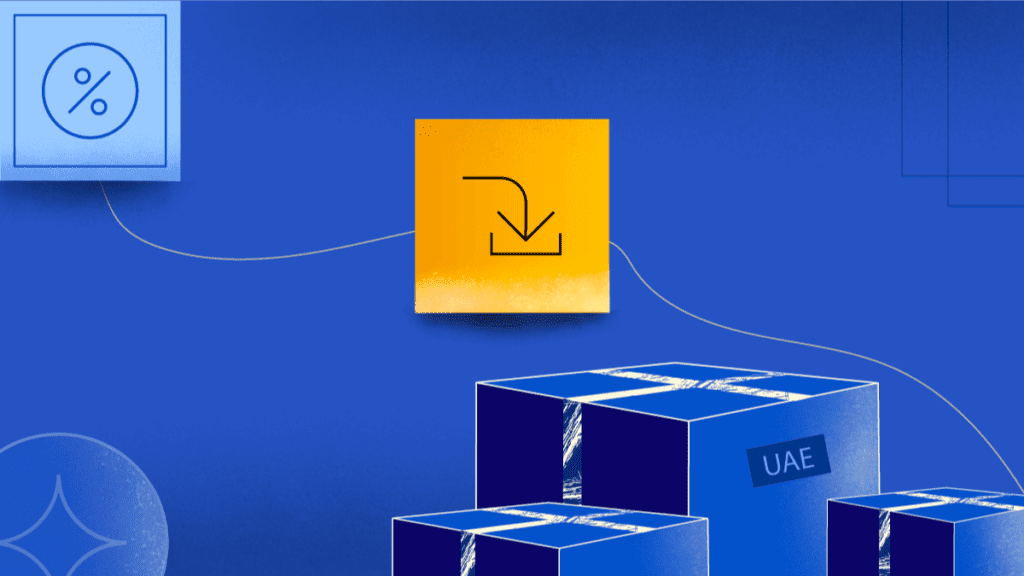
Input tax recovery is a key feature of the UAE’s VAT system, offering significant financial relief for exporters. This mechanism allows businesses to claim back the VAT they have paid on goods and services used in producing and delivering exports. By enabling VAT recovery, the UAE ensures that the tax burden remains neutral, helping exporters maintain cost efficiency and stay competitive in global markets. For example, an exporter of electronics can recover VAT incurred on raw materials, manufacturing equipment, packaging, utilities, and logistics services required for their operations. This reclaim process ensures that the tax paid locally does not inflate the cost of goods sold internationally. As a result, exporters can offer their products at competitive prices without compromising on profitability.
To qualify for input tax recovery, businesses must maintain accurate records of VAT paid on their purchases and ensure that these expenses are directly linked to export activities. Documentation such as invoices, customs declarations, and proof of export (e.g., airway bills or shipping receipts) must be retained to substantiate claims during VAT filings or audits. This level of accountability fosters compliance while streamlining the tax recovery process for exporters.
By leveraging input tax recovery, the UAE supports exporters in minimizing operational costs, enabling them to focus resources on expanding into global markets. This feature not only reinforces the UAE’s position as a global trading hub but also incentivizes businesses to invest in export activities, driving sustainable economic growth.
What is Input Tax Recovery?
Input tax refers to the VAT paid by businesses on goods or services used in their operations. For exporters, recovering input VAT ensures that the costs of materials, utilities, logistics, and other expenses do not become a financial burden.
For example, a business exporting electronics can claim VAT paid on imported components, packaging materials, and shipping services.
Steps to Reclaim Input VAT
- Maintain Detailed Records: Ensure all supplier invoices, shipping receipts, and other documents are accurate and complete.
- File VAT Returns on Time: Submit regular VAT returns detailing input VAT and the zero-rated exports.
- Apply for Refunds: If input VAT exceeds output VAT, businesses can apply for a refund from the Federal Tax Authority (FTA).
Tulpar Global Taxation helps exporters streamline the input VAT recovery process, ensuring maximum refunds and minimal delays.
The Role of Tulpar Global Taxation
Navigating the intricacies of VAT regulations can be a daunting task, especially for export-oriented businesses that must comply with both local and international tax laws. From understanding zero-rated VAT provisions to managing input tax recovery and maintaining accurate documentation, the process involves multiple layers of compliance. This is where Tulpar Global Taxation steps in, offering comprehensive and tailored solutions designed to simplify VAT management for businesses.
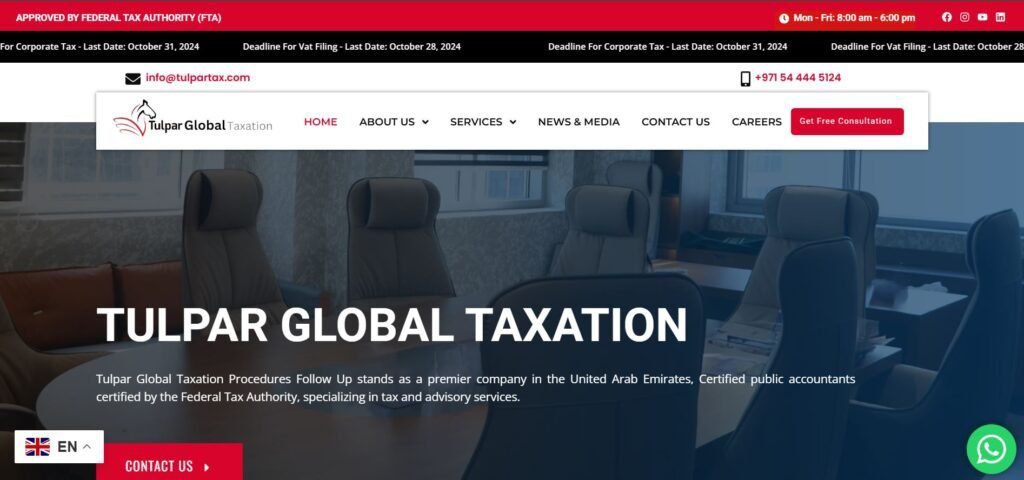
Tulpar Global Taxation specializes in helping businesses achieve full VAT compliance while optimizing their tax processes to reduce operational burdens. For exporters, this means ensuring that all transactions meet the necessary legal requirements to qualify for zero-rating, such as preparing accurate customs declarations, shipping evidence, and export invoices. The firm also provides expert guidance on reclaiming VAT on business expenses, helping companies maximize their tax recovery while maintaining financial efficiency.
In addition to compliance, Tulpar Global Taxation assists businesses in streamlining their record-keeping practices to ensure they are prepared for audits or inspections. By implementing best practices for maintaining export-related documentation, such as proof of shipment and recipient details, Tulpar minimizes the risk of non-compliance penalties. Their expertise in VAT regulations and global trade dynamics allows exporters to focus on their core operations while leaving the complexities of tax management to a trusted partner.
By partnering with Tulpar Global Taxation, businesses gain access to a team of professionals with in-depth knowledge of UAE VAT laws and global trade requirements. This partnership not only simplifies the tax process but also enhances the competitiveness of exporters by ensuring their tax obligations are handled efficiently and accurately. Whether it’s navigating cross-border tax scenarios or optimizing VAT filings, Tulpar Global Taxation equips businesses with the tools and support they need to thrive in international markets.
Services Offered by Tulpar Global Taxation
- VAT Registration and Advisory: Ensuring businesses are registered and aware of their obligations under UAE VAT laws.
- Documentation Review: Verifying export-related documents to ensure compliance with zero-rating conditions.
- VAT Return Filing: Accurate and timely submission of VAT returns.
- Input Tax Recovery Assistance: Maximizing VAT refunds for exporters.
Their expertise helps businesses focus on growth while ensuring compliance with UAE VAT regulations.
Export products from the UAE are generally subject to 0% VAT (zero-rated), not the standard 5% rate. This means VAT is charged at zero percent, provided specific conditions are met. Zero-rating helps UAE businesses remain competitive in international markets.
An export refers to goods that are supplied from the UAE to a place outside the UAE. The goods must physically leave the UAE territory. Proper customs and shipping documentation is required to prove export status.
Yes, VAT is charged at 0% on invoices for qualifying exports. The invoice must clearly indicate that the supply is zero-rated. Incorrect invoicing can lead to rejection of zero-rating during audits.
Businesses must maintain export evidence such as customs exit documents, airway bills, bills of lading, and commercial invoices. These documents prove that goods have left the UAE. Missing or incomplete documents may result in VAT being assessed at 5%.
Yes, businesses can recover input VAT incurred on costs related to zero-rated exports. This includes VAT on purchases, logistics, and overheads linked to export activities. Proper documentation is essential for recovery.
Zero-rating applies only if all legal conditions are met. If goods do not leave the UAE within the required timeframe or export proof is insufficient, the supply may become standard-rated. Compliance with timelines and documentation is critical.
Indirect exports occur when goods are supplied to a customer in the UAE who then exports them. VAT treatment depends on specific conditions and responsibilities defined by law. Incorrect treatment of indirect exports is a common compliance risk.
Free Zones are not automatically outside the scope of VAT. Exports from Free Zones may still qualify for zero-rating if goods leave the UAE. VAT treatment depends on movement of goods, not Free Zone status alone.
Common mistakes include missing export evidence, incorrect VAT invoices, and misunderstanding indirect exports. Many businesses also assume zero-rating without verification. These errors often trigger VAT audits.
Businesses should review export transactions, maintain complete documentation, and reconcile VAT returns regularly. Working with experienced VAT advisors like Tulpar Global Taxation helps ensure correct zero-rating and protects against penalties.
